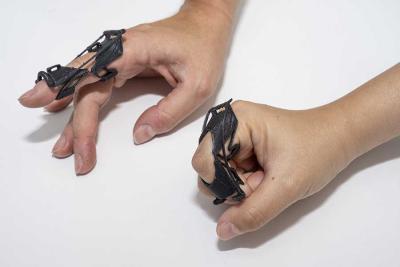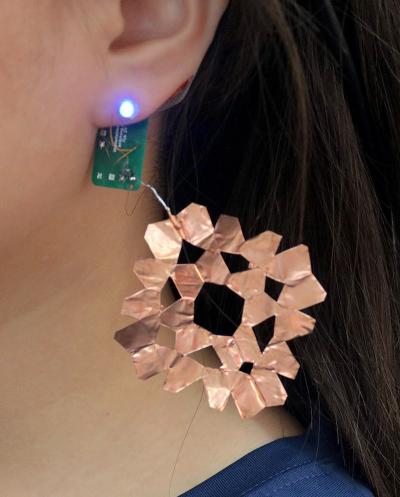Physical Interfaces – Sensing, Haptics, Fabrication
Physical computing bridges the gap between digital and physical worlds by creating interactive systems that sense and respond to real-world conditions. This enhances user experiences through novel interactions.
There are elements of physical interfaces that help us to study how people interact with computers and systems. For example, sensors detect environmental conditions, track movements, or locate touch points. Haptics provide tactile feedback and can make VR interactions feel more realistic. Fabrication blends computer science, design, engineering and manufacturing to turn digital files into physical objects using machines such as 3D printers, knitting or weaving machines, and CNC routers. Digital fabrication allows for rapid prototyping, customization, and the creation of complex geometries optimized for material properties. Our researchers in this area spend a lot of hands-on time building and iterating in our labs.
Students who want to learn more about HCI + physical interfaces might be interested in the following courses:
Faculty Researchers
-

Arakawa Recognized with Two Awards at UbiComp / ISWC
NEWSRiku Arakawa, a fifth-year human-computer interaction Ph.D. candidate, received the Gaetano Borriello Outstanding Student Award and Best D...
-
HCII at UIST 2025
NEWSWhat’s next in the future of user interfaces? Look no further for some possibilities. Faculty and students from the Human-Computer Interac...
-

This Stapler Knows When You Need It
NEWSA stapler slides across a desk to meet a waiting hand, or a knife edges out of the way just before someone leans against a countertop. It ...
-

CMU Researchers Develop Customizable Finger Brace for Injury Recovery
NEWSCMU researchers created the first-ever 3D-printed finger brace that easily shifts from rigid to flexible, eliminating the need to take it ...
-

CMU Technology Helps People Maintain Health at Home
NEWSAn app designed by Carnegie Mellon University researchers uses artificial intelligence to assess depression and fatigue. The goal? To bett...
-
![image for the "[does] Compute" podcast, presented by the CMU School of Computer Science and Geekwire](/sites/default/files/styles/400px_wide/public/2025-09/does-compute-season-2.jpg?itok=RsFRrPi3)
Season Two of 'Does Compute' Now Available
NEWSFrom Oscar-winning work in computer graphics to solving problems inside the human genome, Carnegie Mellon University's top-ranked School o...
-

Ion Receives NSF CAREER Award for Material-Changing Interfaces
NEWSImagine a hard floor that adapts to cushion the impact of your fall, or a chair that adjusts its firmness and ergonomic support based on y...
-

Researchers Create Flat-to-Shape Objects With Computer-Controlled Sewing
NEWSCMU researchers introduced a novel method for fabricating functional flat-to-shape objects using a computer-controlled sewing machine. ...
-

Protecting Audio Privacy at the Source
NEWSSound is a powerful source of information. By training algorithms to identify distinct sound signatures, sound can reveal what a person is...
-

SCS Researchers Develop Method To Transmit Power Through the Body
NEWSPeople with diabetes rely on continuous glucose monitors to keep track of their blood sugar, but eventually the monitor's batteries need t...

PrISM: Procedural Interaction from Sensing Module
PROJECTThere are numerous complex tasks in everyday life, from cooking to medical self-care, that involve a series of atomic steps. Properly executing these step...
-

Brewing Sustainability
NEWSIt took a lot of coffee to power Mike Rivera’s push toward a doctorate degree in human-computer interaction at Carnegie Mellon. And it too...

